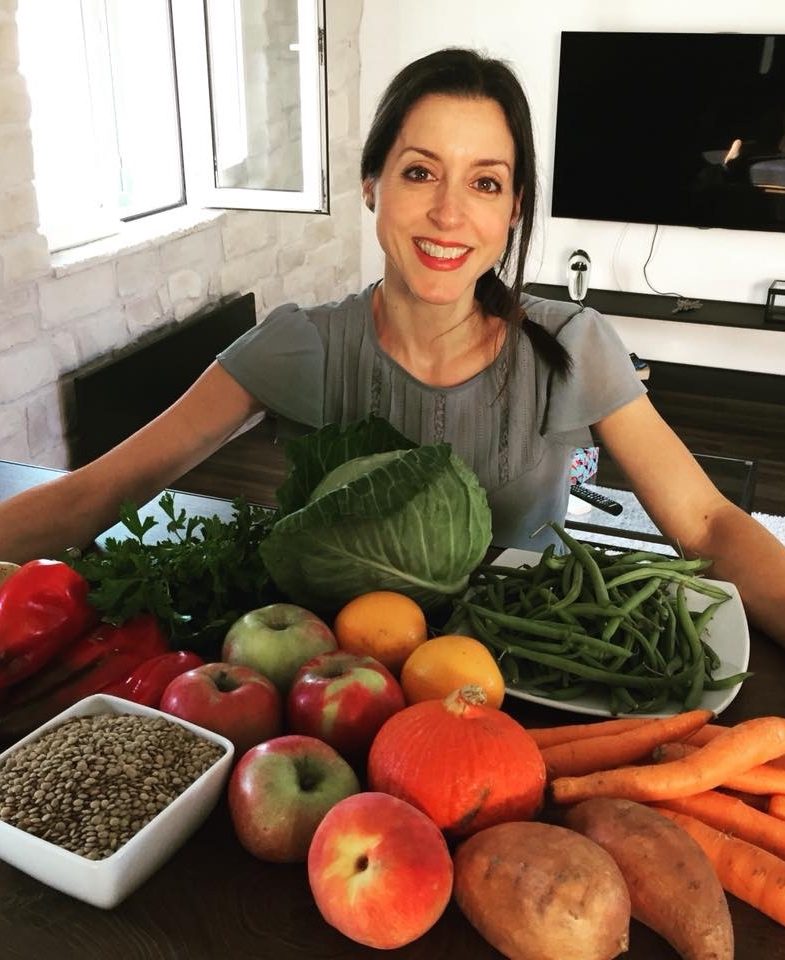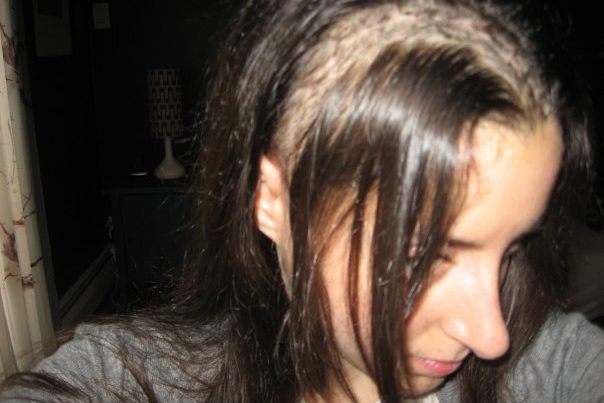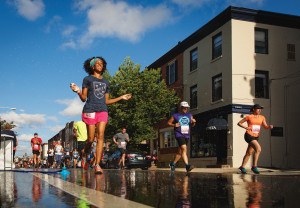A Brain Tumor Inspired This Philly Woman’s Switch to a Plant-Based Diet
Andrea Corbi Fein's terrifying diagnosis catalyzed a major lifestyle shift.

Andrea Corbi Fein went from worrying about her mortality post-brain tumor surgery to loving life on a plant-based diet. / Photograph courtesy of Andrea Corbi Fein
As a complement to our recent feature package, “The Wildly Expensive Cost of Prescription Drugs,” we’re exploring how Philadelphians are managing their health without pills. Here’s one local’s story.
Who I am: Andrea Corbi Fein (@acfein), 44, video editor
Where I live: Bella Vista
“In September 2009, I awoke with an explosive headache, screaming in pain. After days of suffering and an on-the-spot diagnosis of Lyme disease from my doctor, I was later advised to get checked at the emergency room. CT scans and an MRI revealed a circular object in the front part of my brain — what doctors described as a lesion. It was shocking to see my own brain with something foreign growing in it.
The gravity of the situation came to me pretty quickly when I learned they were going to remove the ‘lesion’ through brain surgery. While they shaved clumps of my long brown hair and mapped out the resection plan, I remained surprisingly calm, a fact that still puzzles me today. Maybe it was because I had no other option for pain relief; I had to give up control to the surgical team, and that left me at peace.
I felt confident in the Thomas Jefferson University Hospital staff. My amazing surgeon, Dr. James Evans, successfully removed not only a meningioma [a type of tumor that grows on membranes covering the brain and spinal cord] but also a bleeding AVM [a defect in the blood vessel system], which could’ve caused catastrophic damage like stroke or death. When I woke up after surgery, I wiggled my toes to check my mobility and felt instantly grateful to be alive with the continued ability to walk and talk.

Corbi Fein a week after doctors removed a tumor from her brain. / Photograph courtesy of Andrea Corbi Fein
During my recovery, I was dizzy and had racing thoughts, which I attributed to having my skull sawed open and stitched back together. As I sat with nothing to do but heal, I took a breath and assessed my life. My mom had just died the year before at age 64; my dad died at 48; and there I was healing from major brain surgery at age 34. I felt as if I didn’t have “good” genes, and the reality that I almost lost my life was unsettling, so I became motivated to protect it.
I understood there was a correlation between food and health, so I decided to keep a detailed, daily journal of everything I ate combined with notes of how I felt. This ritual of recording the food I chose to put into my body made me feel more accountable for my actions, more mindful of my food choices and, ultimately, like I was on the road to controlling my health.
Over the next couple years I made moderate, healthy changes. I consumed less alcohol, ate more salads, continued my journal, and worked on my relationships. I had the occasional headache. But even though the annual MRI scans of my brain were clear, I was still concerned I’d regrow a tumor or I’d die young. I must have communicated this to my friend Donna because, in 2012, she shared a video that helped jumpstart a new me.
The video “Uprooting the Leading Causes of Death,” created by Dr. Michael Greger from Nutritionfacts.org, was a presentation highlighting the power good nutrition can play in helping to prevent chronic disease and increasing longevity. He talked about how a diet based around whole grains, beans, legumes, vegetables, fruits, nuts and seeds lowers the risk for some of the most common chronic diseases, including heart disease and stroke. My preconceived beliefs about bad genes dictating your life were shattered when I heard the sentence, “Just because we may have been dealt some bad genetic cards doesn’t mean we can’t reshuffle the deck with diet.” Hearing from a doctor that you can take positive steps to improve the likelihood of chronic disease based on what you eat was the kind of empowering information I had been yearning for since brain surgery. I watched on for more details like this was an action-packed, summer blockbuster movie. On the spot, I decided to eat a plant-based diet for two weeks.
I started by making simple, animal-based to plant-based swaps. I made things like smoothies with plant-based milks, bean burritos with extra salsa and without cheese, avocado toast instead of hard-boiled eggs on toast, whole wheat pasta with marinara and crushed red pepper instead of cheese. Apples, almonds, and carrots took the place of yogurt for snacks. And I discovered the joys of coconut ice cream. At the end of the two-week “trial,” my skin looked great, and I had a better outlook on my future health.
Six and a half years have now passed, and my plant-based “experiment” continues. I always loved to cook, but it now has a deeper meaning. Making meals around different vegetables, pastas, grains, beans, spices, and sauces has improved my creativity and palate. So did earning a certificate in professional plant-based cooking through Rouxbe’s culinary school, which took six months of dedication and delightful taste-testing. My free time is spent reading books, devouring presentations and podcasts, and attending conferences about emerging data regarding food and health. My food journal is now on its 3,400th entry.
In addition to my dietary changes, in 2012, I added more regular and regimented forms of exercise. I’m a city dweller and walking to get groceries and meeting people out had been my regular workout until I started attending group fitness classes at Philly Dance Fitness and running. I also start every day with a five-minute plank and walk for 30 minutes daily during my lunch break. Yoga with friends is a fun thing to throw in the mix occasionally, too.
I am very happy with where I am now, but I never want to be too comfortable as growth and change happens when you are UNcomfortable. I’m constantly on the lookout for ways to push myself to get out of the comfort zone to grow and learn.
If there’s anything I want people to take away from my transformation, it’s that you may have more control over your health than you think. As Hippocrates says, ‘Let food be thy medicine and medicine be thy food.'”


